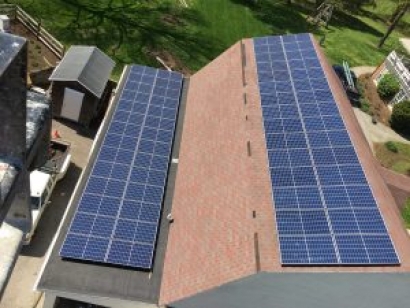
Offering a lower-cost, clean, versatile and renewable alternative to fossil fuels, both private households and commercial enterprises such as farms understand the benefits that making the switch to renewables can provide.
One of the biggest attractions for agriculture is the financial benefits that using geothermal energy and solar can provide. “Rising costs of electricity are adding to the escalating overheads faced by UK farmers which affect profitability,” say agricultural energy professionals Mypoweruk.com.
By installing solar panels on unused roof space and adopting geothermal technologies, farmers can increase crop yield, enhance business operations and boost profitability. This will help ensure that future generations can benefit from British agriculture for decades to come.
In this article, we will look at the importance of switching to renewable energy in agriculture more closely, review its applications and consider how it can benefit farmers across the UK and the world.
The case for geothermal and solar energy for agriculture
According to an article in the Guardian newspaper, “The UK’s renewable electricity outpaced its fossil fuel generation for the first time in 2020 and could remain the largest source of electricity in the future.”
In part, this is because the UK provides the perfect environment for generating renewable energies via hydropower, solar and geothermal energies. Even when the sun isn’t shining, developments in battery storage technology allows energy to be used.
Farmers have been harnessing the power of nature for thousands of years now, so their readiness to adopt sustainable energies shouldn’t come as a surprise.
According to a poll by the National Farmers’ Union (NFU), 30% of UK farmers intend to invest in energy efficiency and alternative fuels in the short term and 37% said they are already self-generating or procuring renewable energy to meet their needs.
This could allow them to:
From an environmental perspective, renewable energy sources such as geothermal energy and solar provide the ideal, low-footprint solution that helps to protect the future of the planet and maintain the UK farming tradition.
How can geothermal and solar energy be used in agriculture?
Renewable energies have a wide range of uses within farming and agriculture. This includes everything from powering machinery, generating extra profit, maintaining ideal greenhouse conditions, promoting crop growth, drying food and even pasteurizing milk.
Irrigation pipes can bring hot water to cold ground. This allows farmers to nourish plants that would otherwise be damaged or die and extend the growing season.
Steam from pipes underneath to heat the soil or above can also be used to sterilize the soil and kill pests, fungus and diseases. As UN humanitarian organization, ReliefWeb says, “...using geothermal heating for greenhouses decreases fungus infections and cuts fuel costs by up to 80%, providing significant savings to operating budgets.”
The use of geothermal and solar can help keep greenhouse conditions at the ideal temperature and level of humidity for a more reliable crop and faster-growing plants. Techniques can include plastic tubes, finned pipes, soil heaters and unit heaters.
Renewable energies are widely used across the world to dry foods and ensure they are available during times of the year when the crop is scarce. For example, Australia has seen great success with drying alfalfa plants with geothermal energy, and a government-funded project in Algeria has successfully produced an average of 1700 tons of Tilapia per year.
Reducing energy costs
Operating dairy units, chicken sheds, refrigeration stores, farm diversification units or grain stores can be expensive. However, farmers continue to see a huge reduction in energy costs as a result of adopting geothermal and solar energies.
In fact, according to a report by International Energy Agency’s World Energy Outlook 2020, solar provides the “cheapest…electricity in history.”
Geothermal and solar power provide farmers with a low-cost, clean energy source. Reducing overheads, promoting more efficient crop growth, protecting nature and offering additional financial benefits, it’s no surprise that global agriculture is undergoing a renewable power revolution.
Charlotte Murphy is a freelance writer with a passion for technology, specifically its applications into the rural business and farming industries. When she isn't writing, Charlotte can be found recreating "fakeaway" dishes in her kitchen or walking with her cocker spaniel, Ringo.

